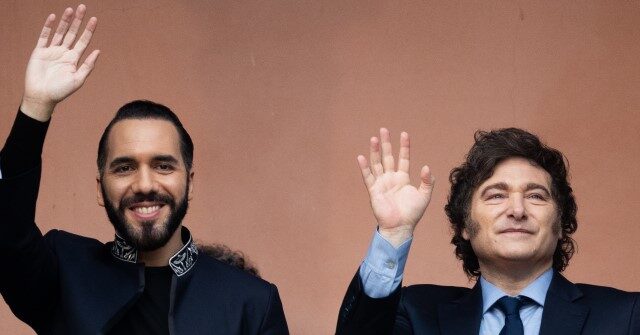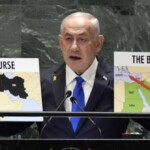The President of El Salvador Nayib Bukele met his “great friend,” Argentine President Javier Milei, on Monday during his first visit to the South American nation since he took office in 2019.
Milei granted Bukele an hour-long private meeting at the Casa Rosada (“Pink House”) presidential palace while several Argentine ministers met with their Salvadoran counterparts in tandem. Milei and Bukele then held a broader meeting in the company of their respective delegations.
According to the Salvadoran presidential office, the countries signed joint project agreements on nuclear energy, culture, sports, airport hubs, and water resources management. The countries also vowed to strengthen their commitment and “strategic cooperation” in economy and security.
Monday’s meeting marks the second official encounter between the presidents following Milei’s visit to El Salvador on June 1 on the occasion of Bukele’s swearing in ceremony for his second presidential term (2024-2029).
The two additionally met on the sidelines of the United Nations General Assembly last week where, according to reports, Bukele agreed to swap positions on the list of speakers with Milei to avoid an impasse between the Argentine president and Iranian President Masoud Pezeshkian. Milei’s speech, reportedly, was originally scheduled minutes before Pezeshkian’s.
Argentina holds Iran and its proxy, the Shiite jihadist organization Hezbollah, responsible for the 1994 bombing of the Argentine-Israeli Mutual Association (AMIA) and the 1992 bombing of the Israeli embassy in Buenos Aires. The 1994 AMIA bombing was the deadliest terrorist attack in the Western Hemisphere prior to the September 11, 2001, attacks.
Under Milei, Argentina has “realigned” its foreign policy, embracing the United States and Israel as its main allies following nearly two decades of socialist governments that pushed the nation towards China, Russia, and Iran.
The Salvadoran president arrived last Thursday in Argentina but reportedly spent the weekend in the southern region of Patagonia carrying out a private agenda. Bukele kicked off his official agenda on Monday with a wreath-laying ceremony at the monument of Argentine independence hero José de San Martín in Buenos Aires in the company of Argentine Foreign Minister Diana Mondino.
“I have the best impression in the world of Milei, I love what he does, we are friends and we are going to achieve good things for both countries,” Bukele told reporters at the wreath-laying ceremony before heading off to his meeting with Milei at the Argentine presidential palace.
According to local Argentine media, one of the objectives of Bukele’s visit to Argentina is to discuss security and justice management in both countries. Bukele has enacted a massive crackdown against El Salvador’s violent criminal gangs that has resulted in a dramatic reduction in crime and the reported “virtual disappearance” of the gangs from its territory.
Shortly after taking office in December, Security Minister Patricia Bullrich expressed her intention to adapt El Salvador’s security policies and began holding talks with Salvadoran officials to help reduce crime in Argentina, with a special emphasis on the crime-plagued city of Rosario, considered to be the most violent city in the country.
Bukele confirmed the security cooperation between both countries in February and asserted that Argentina’s measures “wouldn’t have to be so drastic” as the ones implemented by his government as, “in the face of smaller problems, maybe the medicine can be smaller.”
Bullrich traveled to El Salvador in June, visiting the country’s 40,000-bed “mega prison” built by Bukele in 2023 and holding meetings with Bukele and her Salvadoran counterpart Gustavo Villatoro.
Argentine presidential spokesman Manuel Adorni applauded Bukele’s management of security issues as an “example to follow” and asserted that the exchange of experiences and knowledge between Bukele’s technical teams and Bullrich’s team has led to a 10.6-percent reduction of the national homicide rate, and a 60-percent drop in Rosario.
“As Minister of Security, I signed a historic agreement with El Salvador that reflects a paradigm shift in the fight against narcoterrorism that we have been carrying out,” Bullrich said on Tuesday morning. “This new revolutionary doctrine is based on several fundamental principles: territorial control as the axis of sovereignty, coordination in the fight against drug trafficking and firm support to our Federal Security Forces.”
“We are taking a firm and forceful step in this war against crime to eliminate once and for all this cancer from our societies, because our countries belong to good citizens,” she continued.
Bukele will reportedly conclude his official agenda on Tuesday with a visit to the Argentine Congress, where he is slated to meet with Vice President Victoria Villaruel.
Christian K. Caruzo is a Venezuelan writer and documents life under socialism. You can follow him on Twitter here.



